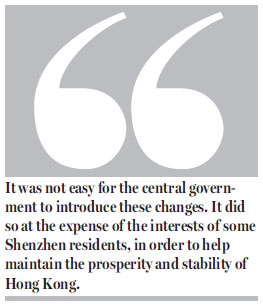Policy shows Beijing's concern
Updated: 2015-04-15 07:57
By Leung Kwok-leung(HK Edition)
|
|||||||||
Leung Kwok-leung believes that Hong Kong citizens should be grateful for the support by the central government and for the sacrifices made by Shenzhen residents
In a move to control parallel trading activities in Hong Kong, the central government has decided to replace the multiple-entry permit scheme, which had virtually allowed Shenzhen residents unlimited entry into Hong Kong, with the "one visit one week" scheme.
The new measures will not affect the current 1.6 million multiple-entry permit holders until their current permits expire. But they will need to follow the new rules when they renew their permits.
According to relevant statistics, among the 1.6 million existing multiple-entry permit holders, around 30,000 Shenzhen citizens visited Hong Kong more than 52 times last year. This means they entered the SAR more than once a week.
It is believed that after all the current multiple-entry permit holders have renewed their entry permits, the annual number of trips made by Shenzhen visitors to Hong Kong could drop by 30 percent from 14.8 million to 10.4 million, according to a previous assessment conducted by the SAR government.
Such predictions are reasonable because only 10,000 Shenzhen visitors, or one-third of the 30,000 Shenzhen residents who visit Hong Kong more than once a week, are reportedly cross-border parallel-traders. Other statistics suggest that less than 10,000 Shenzhen residents are trading in goods from Hong Kong each day. Assuming that 10,000 parallel traders are traveling across the border every day, a maximum of 3.65 million visitor arrivals will be stopped under the new policy. This is much lower than the 4.46 million estimated by the SAR government. In other words, only parallel traders will be targeted. Normal visitors will be unaffected by the new measures.
The multiple-entry permit arrangement has been scrapped following comprehensive research and analysis by the central government. This was aimed at curbing the practices of parallel trading which had been upsetting residents in the New Territories. At the same time, the measures are designed to minimize the impact on Hong Kong's travel industry and on people's livelihoods. The move shows the central government's care and support for Hong Kong people.
Inevitably, the new policy will hurt Shenzhen residents. Some of them have been taking advantage of being allowed unlimited access to Hong Kong to buy better-quality goods at cheaper prices than in the mainland. These people import consumer goods from Hong Kong and resell them in Shenzhen or other inland cities to make a profit. These goods are mostly daily necessities. The profits they earn are actually quite small. Parallel trading is not the terrible crime it is sometimes made out to be. In fact, it helps solve livelihood problems facing many people, particularly some Shenzhen residents on low incomes. With the scrapping of the multiple-entry permits, these people will lose their livelihoods.
By contrast, parallel traders based in Hong Kong are expected to benefit from the new policy. They account for 70 percent of parallel traders, according to recent surveys.
As mentioned above, around one-third of the 30,000 Shenzhen residents who visited Hong Kong more than once-a-week are parallel traders. The remainder, some 20,000 people are ordinary visitors or business travelers in Hong Kong. It is difficult for business travelers to apply for new business travel permits, especially for employees in small-scale private enterprises. The members of some Hong Kong families, who are Shenzhen residents and go to Hong Kong on the multiple-entry permits because they have to look after their families in Hong Kong, will also suffer under the new policy.
It was not easy for the central government to introduce these changes. It did so at the expense of the interests of some Shenzhen residents, in order to help maintain the prosperity and stability of Hong Kong. Hong Kong people should express their gratitude to residents from the neighboring city for their understanding.
Civic Party lawmaker Claudia Mo, however, refused to acknowledge the magnanimity shown by the central government and Shenzhen citizens on this issue. Instead, she warned that a sudden influx of Shenzhen parallel traders would occur in the near future. This is because they would take advantage of their existing multiple-entry permits before they expire. Such estimates are groundless because a total of no more than 10,000 cross-border parallel traders can hardly be described as "a sudden influx". Claudia Mo's irresponsible speech has hurt the relationship between the two cities. Such comments were inappropriate for a lawmaker.
The author is a veteran journalist based in Hong Kong.

(HK Edition 04/15/2015 page10)